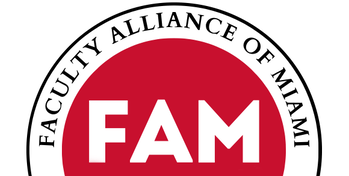We have permission to share with you a valuable email discussion of SR20-08 by members of Senate. SR20-08 is the resolution that would abolish the cap on TCPL* faculty.
We point you particularly to Professor Thesz’s second point and to Professor Coates’ concern about the teacher-scholar model.
We’re delighted to see the level of informed engagement happening around this issue, and we’re grateful to the Provost and Professors Thesz and Coates for their generosity and willingness to participate in public dialogue.
AAUP’s take on the issue is here: Open Letter to Miami Senators.
From Provost Jason Osborne:
Let me…remind everyone that this proposed resolution (SR20-08) was a direct response to a shared-governance committee appointed last year and which did a thorough job of evaluating the current complex web of issues facing us as an institution and higher education in general. It seems to me important to remember this is not an initiative solely driven by “the administration” -many of which are tenured faculty members like me who value our exceptional faculty and the critical role of an engaged, permanent faculty. I will argue that what university-level restrictions or prohibitions do is to eliminate the possibility of faculty and leaders within divisions governing themselves. It assumes faculty within different divisions cannot appropriately manage themselves and their available resources. I choose to believe differently and I will be happy to discuss this and any other issue thoroughly Monday so that senators feel fully informed about these complicated issues. I will also share examples of who some really strong peer institutions handle this issue.
I hope all of you have a wonderful weekend!
in Love and Honor,
Jason Osborne
From Professor Nicole Thesz:
Dear Fellow Senators, dear Provost Osborne:
Many thanks for sharing your thoughts and concerns. Given the weight of the upcoming decision (SR 20-08), I would like to add some additional thoughts:
1) SR 20-08, in its current form and context, is an institution-altering resolution, and I urge all of us to consider its ramifications with care before a vote. There are high anxieties on either side – on the one hand, the realities of the challenges that higher education faces, and on the other hand, the fear of losing a model of education that has served the U.S. well, making U.S. universities world leaders in many fields. Because the stakes are so high, I would suggest that we conduct several meetings with discussions before taking the resolution to a vote, and not voting on this before January or February. This will allow adequate time to communicate with constituents and to address the other aspects that are part of the discussion: guidelines/caps on visiting faculty, the changing teacher-scholar model, the commitment to maintaining active scholarship in all divisions. We are not merely discussing a 5% shift in a TCPL cap, but its removal, and this cannot be taken lightly.
2) I’d also like to suggest that we discuss the connections between departments, divisions, and university-wide resources. Since “lines” are currently under the auspices of the Provost’s office, decisions about hires are not entirely under divisional control.** The dialogue between divisions and university/Provost’s office could be further clarified, since SR 20-08 implicitly communicates that hiring decisions will become more “local” under this resolution.
3) Finally, I would like to emphasize the need to neither give in to fear nor to a desire to act quickly. If we address these issues transparently and with care, we will come to a joint decision that benefits all parts of the university.
Thank you!
Best,
Nicole**emphasis added by AAUP
From Rodney Coates:
Provost Osborne et al..
Thanks for this discussion. It’s what shared governance and the Senate as a deliberative body should be about.
I have one central concern and that is what exactly constitutes the teacher-scholar model? This model, I would argue, is fundamental to how we perceive ourselves as a University. What is the basis of this, how does the availability of tenure effect this, and what does this say about the appropriate mix of faculty positions? As we look at the history of these conversations, these questions have been driving the process.
Therefore, I urge that regardless of who and what level the decisions are made, we reaffirm our commitment to the teacher-scholar. And then, establish what that commitment means. Is there a point at which the teacher-scholar model no longer applies? At what point is that? HOW does this relate to the composition of the faculty? What are the standards of this across academia? Do we care?
I hope that we do not rush to judgenent with reference to these questions, for the very identity of Miami is at stake.
Rodney D. Coates
*TCPL are Teaching Professors, Clinical and Professionally Licensed faculty.

Leave a Reply